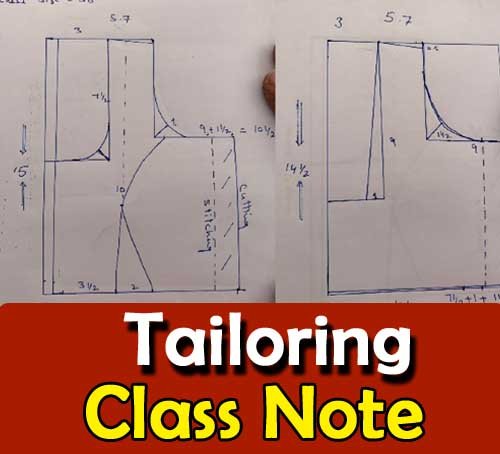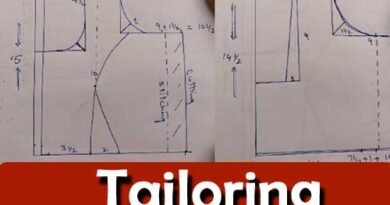Inspection and Alterations for Fitting
Unit Objectives
At the end of this unit, you will be able to:
1 Know the importance of basic elements of garment hitting.
2 Carry out fitting inspection.
3 Recognise the common fitting errors and their solutions.
Basic Elements of Garment Fitting
A well-fitted garment is very important to reach the satisfaction level of a client who wears tailored attire Every detail has to be attended to, when a tailor does fittings if the fittings are improper the look and design of the garment completely destroyed
A good fit is based on 5 classic elements
1 Grain: For a good fit the garment should be cut on the right grain. If the costume is off-grain, the seams lines may twist or hang crooked. Imprecise cutting or stitching may result in deviation in the grain line
2. Set: Is when the garment fits perfectly without any undesirable wrinkles Wrinkles usually occur because the garment is too large or too small for the customer
3.Line: Refers how the lines of the garment are in alignment with the natural lines of the body. Poor design or
construction can result in an out of line garment
4. Balance: occurs when the garment is in equilibrium. The garment should appear symmetrical, when viewed
from any angle.
5. Ease: Is how fitted or airy the fittings of the garment is. A good fitted garment will give some room to breathe and won’t be too fitted or tight.
Carrying Out Fittings Inspection
A tailor must check the following details when he checks the hitings of a garment.
Shoulders
Seam should lie on the edge of the shoulder.
The shoulders should be wide enough to ensure that the sleeves hang comfortably into position.
The shoulder slope of the garment should go in sync with the shoulder stope of the wearer.
Chest/Bust
. The tip of the dart should end about an inch before the fullest part of the curve of the bust.
Incorrect positioning of the dart will make the garment too fitted around the bust area.
Neckline
. The front of the normal neck line should be always larger than the neckline at the back.
. Neckline should not be too large or too small.
Collar
The circumference of the collar should be at least 1/4th of an inch bigger than that of the neckline.
You should be able to slip a finger in between your neck and the shirt at any point without struggling or
forcing.
The collar should neither be too tight nor too loose.
Sleeves
The crosswise grain at the bicep should lie parallel to the floor.
The sleeve should not be too fitted and should hang comfortably.
The sleeve should begin from the edge of the shoulder seam. If it is too high the sleeve would pull.
Waistline
The waistline should not be too fitted or too loose as both can cause discomfort.
The narrowest part of the garment should fall at the wearer’s waist.
Hips
⚫ Garments should have enough room around the hip area.
.Garment should not have excess ease in hip or thigh area as it will result in vertical folds.
Crotch/seat
In order to incorporate comfort and durability, trousers and other bifurcated garments require a well-fitted crotch for A properly tailored crotch doesn’t cut or bind the wearer amid the legs and adapts to the shape of the buttocks There should be slight ease in the crotch area. Crotch length has one inch of ease in the crotch area The back of the crotch seam should be lengthier and more deeply curled than the anterior as the behind of the buttocks are more curved than the front Bigger sizes require longer and deeper curved crotch lengths at the back Oblique wrinkles radiating from the crotch area is because crotch curve isn’t left long enough to allow the size of the buttocks. Diagonal wrinkles in the front may also be due to the wearer’s big abdomen Wrinkles coming upward from the crotch area indicate a too tight and high crotch, causing to chafing and discomfort Wrinkles coming downwards from the crotch area shows a low and loose crotch, it stacks and drops, restricts walking and has increased probability of ripping from strain of movement. If the rise may be elongated or reduced, the waistband should also be raised or lowered. Rise should not be lengthened or shortened in the crotch length as the same may lead to problems where none existed.


